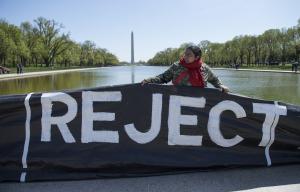The Dutch Postcode Lottery has funded environmental vandalism, piracy and the persecution of indigenous peoples in 2014, through its donations to various environmental organisations. It is one of the largest donors to Greenpeace, and also fills the coffers of the World Wildlife Fund (WWF) and Sea Shepherd, amongst others.
The observation was first made by environmental blogger Bishop Hill, after he noticed a recent article in the Guardian authored by John Sauven, the director of Greenpeace in the UK. “I found it rather astonishing that a newspaper would be giving space to a group that had just caused irreparable damage to a World Heritage Site. Wouldn’t a reputable publisher want to distance itself from such behaviour?” Bishop Hill writes.
“This got me thinking about who else is happy to be associated with Greenpeace and, more precisely, who is actually paying for their activists to run around trashing the world’s cultural heritage and the Peruvian tourism industry.”
It turns out that the biggest single donors to Greenpeace are the Dutch and Swedish Postcode Lotteries, and American organisations The Oak Foundation, and The Climate And Land Use Alliance, all of which are donating in excess of $1 million a year.
Postcode Loterij, the Dutch Postcode lottery run by Novamedia, is currently ranked as the third largest private charity donator in the world by newspaper City AM, donating £470.3 Million in 2013 (at the top of the list was the Bill and Melinda Gates Foundation who gave away £2.169 Billion last year).
Their website shows that, of that total, €15.9 million was given to the WWF – who are currently the subject of a campaign by Survival, an organisation that acts on behalf of displaced tribespeople. In October, Survival announced that they had uncovered a series of abuses of Baka ‘Pygmies’ in south east Cameroon, at the hands of anti-poaching squads funded and supported by WWF. The Baka people have been driven out of the forests that they have lived in for centuries, and face beatings, sometimes even death, if they are caught hunting for food.
Survival’s Director Stephen Corry said: “Tribal peoples are the best conservationists and guardians of the natural world. They know more about their lands and what happens on them than anyone else. If conservation is to work, organizations like WWF need to stick to international law, uphold tribal peoples’ land rights, ask them what help they need in protecting their land, listen to them, and then be prepared to back them up as much as they can. A major change in thinking about conservation is urgently required.”
The Loterij gave €900,000 to Sea Shepherd this year, adding to the €6.3 million they have handed the organisation since 2007. Sea Shepherd, who campaign against whale hunting, are well known for their aggressive techniques. Last year, the U.S. Court of Appeals for the 9th District in Washington upheld an injunction that banned Sea Shepherd crews from targeting ships belonging to Japan’s Institute of Cetacean Research in the Southern Ocean.
Ruling on the dispute, Chief Judge Alex Kozinski said: “You don’t need a peg leg or an eye patch. When you ram ships; hurl glass containers of acid; drag metal-reinforced ropes in the water to damage propellers and rudders; launch smoke bombs and flares with hooks; and point high-powered lasers at other ships, you are, without a doubt, a pirate, no matter how high-minded you believe your purpose to be.”
And, of course, there is Greenpeace, whom the Loterij have been funding since 1996 to the tune of €54.9 million. This year alone they handed over €2.25 million. Yet Greenpeace have just been wholly discredited after allowing their activists to debase the Nazca lines, an ancient relic from Peru’s past.
As Breitbart London’s James Delingpole wrote at the time: “the mysterious ancient desert geoglyphs created over 1,000 years ago are now surrounded by footprints – and a very noticeable C shape – created by Greenpeace activists last week in a publicity stunt designed to coincide with the latest UN climate summit in Lima, Peru.
“Greenpeace markets itself as a charity which values the environment and cares about the needs of developing countries. Yet here it is, caught red-handed, riding roughshod over the interests of both.”

COMMENTS
Please let us know if you're having issues with commenting.